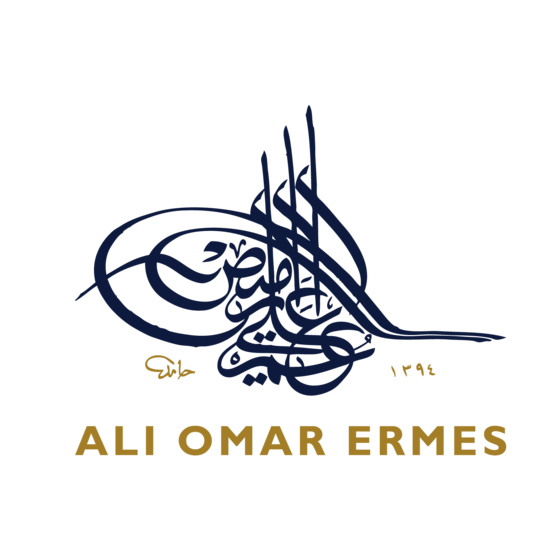The Invisibility of the Arab Community in Britain
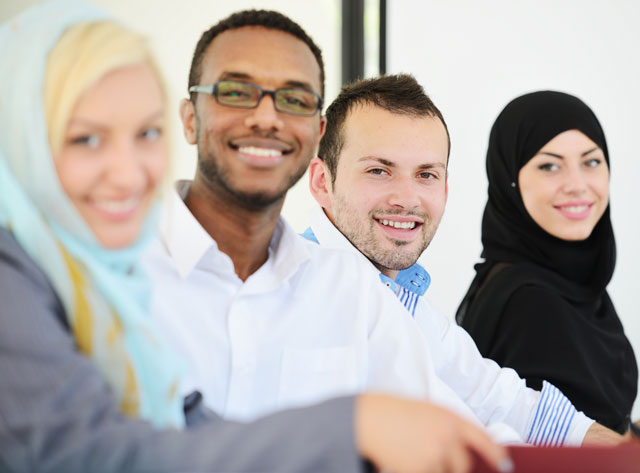
It is no doubt that this is not making sense at all if that is the case why the Arab community with all this positive input to the British society is still invisible, why is it still not getting the rightfully earned place in society, why is its full potential denied?
Is it because the Arab community does not want to be a genuine part of society? Is it because the British society rejects this community, never mind what it says about equality for all citizens etc, etc? Or are there more complex reasons than meet the eye, of which the two previous points are only part. In spite of the fact that we are not going to be able to answer all these questions in detail, I will attempt to shed some light on the Arabs’ relations to Britain.
Without getting too deep in the past, history records that the Middle Eastern people, who were the ancestors of today’s Arabs, came to these shores before the Romans did, they came to mine and export metals such as aluminium from places like Cornwall (Ghassan Sepano ‘Arabs in Britain 2002’, Newcastle Museum and Chester Museum). A few centuries later, Britain became part of the Roman Empire which was ruled by an Emperor who was an Arab from Syria called Philipos, moreover a family of three Roman Emperors, two sons and a father who was a Libyan by descent and birth called Septimius Severus who also died in Britain (Hutchinson, ‘The History of Nations’, Ogan, ‘The Wonderland of Knowledge’) during the second century AD (This Emperor’s son was the one who changed the capital to London, Ghassan Sepano 2001).
To cut a long story short, the Arab relations with Britain are very old and deeply entrenched in history. The first Arabic minted coins in Britain were produced in the 8th century by King Offah Of Meria (The British Museum), who declared his Islamic orientation by putting the words of ‘There is no God but Allah and Mohammed is His Messenger’ on these coins during his reign(The British Museum) . It is curious that recent writers of British history hardly mention things like this and I wonder why?
Back to the future. The nineteenth-century saw a new engagement between Britain and Arabs and due to the British colonisation of some parts of the Arab and Islamic world. A number of Arabs came and settled in Britain e.g. the Syrian merchants and Yemenis in South Wales, Sheffield, Manchester and elsewhere (Halliday ‘Arabs in Britain’). But the real resurgence of this was after the 1950s, when political traumas in the Arab world caused some Arabs to leave their countries of origin, some to America and Britain and other European destinations. Arab migration can also be explained by the fact that many also came here for further education or for business and settled later. Never the less, most of those who came in the seventies, eighties, and nineties intended to go back as soon as the political situation was calm enough to enable this.
On one hand, living in Britain for twenty or thirty years waiting for a change in the political conditions in our motherlands has taken its toll on anyone of us. Children grow up to be young people with their own hopes and aspirations and new responsibilities on these families begin to mount in a way that becomes very difficult to alter, as new life conditions start to appear.
The fact that you’ve invested all your best years in defending and pursuing fairness on society’s framework including the one you’ve settled in together with working with equality between humans in a hope to maintain justice, encourage good practice, reward hard work and promise good ethics for all humankind, means it is difficult to understand the unfair war that has been waged against the Arabs by the media, the press and politicians and decision-makers here in this country. Not to mention the negative effect and harmful results all this has had on Arabs everywhere in the world.
I hope that through this very short presentation we will lay the foundations for positive engagement between all of us, to see if we are able to contribute to more fruitful partnerships as we aspire to make the Civic Forum one of these platforms that genuinely want to bring about the positive changes that are needed.
The Arab community is a distinctive community. This distinctiveness comes about not through differences in colour, looks or attitudes, but mainly through an ingrained subtlety in language, social and cultural values. As such sharing a number of social values and ethics based mainly on religious teachings, with the rest of the society was and still is part of the fruitful contribution to society made by Arabs, whose lands in the Middle East are the birthplace of various religions and civilisations, ever since they invented writing and brought the first laws to humankind (Hamorabi Laws 1728 B.C.E, refer to Faruqi (1986), ‘The Cultural Atlas of Islam’). The rest is history, for the last eight thousand years rapid human development and ascendance of religions gave these societies its continuous social experience and very rich history.
It is reasonable for Arabs to feel protective of this history, for themselves and for all humanity. Protecting the Arabic language for the future generations is an important matter, at least as important as learning the English language in order to connect with and appreciate British society, and we can say that about other issues in Art, Literature, and Science etc.
Ladies and Gentlemen, this is meant to be a very short presentation; I do not want it to go on beyond the essentials. Therefore let me point out some quick ideas, to help both the society at large to understand and value the Arab community, and the Arab community to engage more with the society. These suggestions may help increase the visibility of the Arab community and escape what may be referred to the social exclusion, which exacerbates racism against Arabs.
It is the duty of this government, local authorities and the other various institutions of the society to take a close look to the needs of this group of citizens and act without delay on good intentions by deeds and money.
The Arab community needs the whole of society to help them preserve their values, their ethics etc, as these are manifested in their language, literature, arts and social practices and above all in religions.
The Arab community wants to see justice, seen and done towards their political and social issues.
The Arab community will appreciate all signs of valuing their civilisation, which after all was the basis of today’s civilisation.
Involving the Arab community, in local and national politics can only be achieved through the engagement and positive attitude of social managers in all sectors. This means educating the public for that purpose and for similar issues.
Appointing members of the Arab community in relevant areas of national and local government to relate and communicate with their own community will help to make properly planned efforts of inclusion more efficient and save time and money.
Consulting the Arab community on various issues, which affect them and society as a whole, will go a long way to break these exclusion problems, which hardens feelings on both sides for no good reason.
Including their art, literature, and creative input in mainstream systems of education and museums, theatres and media institutions will increase the public’s appreciation for Arab culture and improve community relations.
Funding and encouraging sponsorship of positive representation about the Arab community in this country in the areas of television and film. Together with further information on their civilisations, values, art, science, will do no harm in helping all sides to fully appreciate each other.
Considering all these as part of the national strategy and putting money where the mouth is, will be the only way to activate any of these ideas.
Ladies and Gentlemen, for a start, I feel this is enough, but if more explanation is needed and there are people who seriously want to listen to and consult with us, I am sure that we can articulate all relevant points in much more detailed proposals.
On behalf of the Arab community, I would like to thank the Voices Commission and the London Civic Forum, its Director and employees who gave us this opportunity to present our case in a welcoming manner. I also want to thank the CRE for hosting this meeting.
Last but not least, I want to thank the following for all their advice, references or contribution:
Fadi Itani from the Muslim Welfare House,
Chris Doyle from the Council for the Advancement of Arab British Understanding (CAABU),
Ghassan Sepano of the Arab Writers and Publishers Association in Britain,
Ibraheem Darweesh from the Al Qudus newspaper,
Jamil Khalil, an activist in politics,
Sabah Al Mukhtar from the Arab Lawyers Association,
Hisham Jehani from middleeastuk.com,
Abdul Latif Abdul Rahman from the Arab British Chamber of Commerce.
I thank all who helped to make this presentation what it is, simple but not poor.
Leave a comment
Also in VALUE ADDED THOUGHT
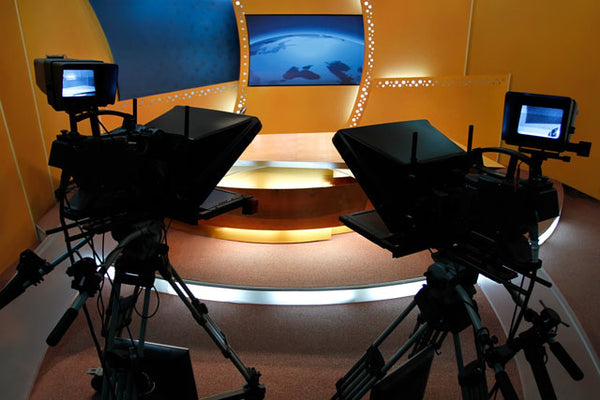
The Arab Media in Britain
Arab Media
Ladies and Gentlemen, before I begin, I would like to remind you that this is a multi-dimensional subject, filled with contradictory issues, concerning approx 300 million people, 22 nations and an anciently, enduring but remarkably modern language. Although in this short space of time, I will only give a general feel of the matter. During the late part of the 1970s, there were a few Arab media outlets such as Al Arab and Asharq al Awsat newspapers and Al-Majaleh magazine that started to appear but it is generally agreed upon that 1980s was the decade that witnessed the birth of the British Arab media.
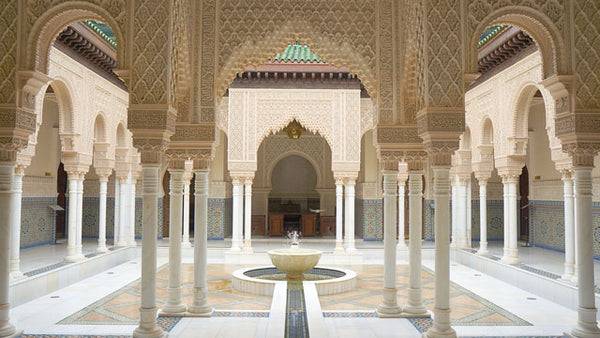
A Glimpse of Islamic Heritage
As part of the events linked to ‘Islam UK’ the BBC’s Islam Season, and hosted by the Council for the Advancement of Arab-British Understanding (CAABU) and the Centre for Near and Middle East Studies (SOAS), Arab artist Ali Omar Ermes presented a slide show entitled ‘A Glimpse of Islamic Heritage’.
The slide show consisted of around 150 photographs, taken over the last 30 years by Ali Omar Ermes himself, each one showing an example of the vast heritage and history of Islam.
The slide show consisted of around 150 photographs, taken over the last 30 years by Ali Omar Ermes himself, each one showing an example of the vast heritage and history of Islam.
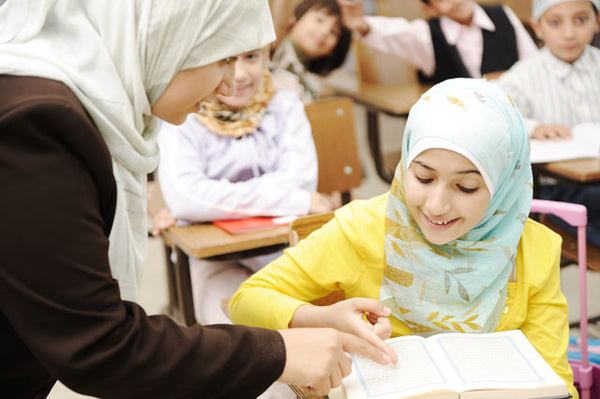
The Importance of Faith-based Education for the Muslim Community
This is a speech made by Ali Omar Ermes at the ‘Faith in the UK and Development Education Seminar’, which took place on Tuesday 11th March 2003 and was organised by the Development Education Association.
Ladies and gentlemen, this is a big subject with a huge debate entailed. However, for your overwhelming good fortune and my relief, I can gladly tell you that this is not a full engagement for the subject, which can take a long time and can be very academic.
Ladies and gentlemen, this is a big subject with a huge debate entailed. However, for your overwhelming good fortune and my relief, I can gladly tell you that this is not a full engagement for the subject, which can take a long time and can be very academic.
